As we enter the New Year you’ll notice a couple of new aspects to DISCoveries. “Strings Attached” is a column in which Terry Robbins will “round-up” recent releases featuring the violin family – concertos, sonatas and chamber music offerings from the international catalogue on a monthly basis. We also welcome Jason van Eyk, long familiar for his “In With The New” column in these pages, to our roster of reviewers. You’ll find his take on a new piano disc by Rachel Kiyo Iwaasa in the Modern and Contemporary reviews. As for my own column, as the snow piled up outside my window over the past two months, so have the mounds of CDs on my desk. I’ve had lots of listening time to explore innumerable new releases which only makes the task of selecting what to include here that much more difficult. Some of the highlights from my hibernation are included below.
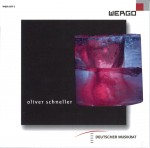 In my other life as general manager of New Music Concerts I have had the pleasure of being exposed to the music of some of the world’s most exciting compositional talents over the past decade. Last May, in a concert curated by Brian Current, Canadians Nicole Lizée and Analia Llugdar were featured alongside Frenchman Fabien Levy and Germans Enno Poppe and Oliver Schneller. Schneller’s delicate Trio (1998) for accordion, cello and piano was featured on that Toronto concert and I was pleased to find it on a new Wergo recording along with five more recent Schneller compositions (WER 6579-2). Trio and Aqua Vit (1999) for eight instruments are the only purely acoustic compositions on the disc, with all of the more recent works involving live electronics. Schneller’s fascination with the nature of sound itself is evident even in the instrumental compositions, as he examines textures and timbres as if through a microscope. This concern is taken further with his use of technology in the later works, most notably Stratigraphie I (2006) and II (2010), both for six instruments and live electronics. Also of note is his alluring addition to the two pianos/two percussion repertoire with Resonant Space, a compelling work which adds live sound manipulation to the mix.
In my other life as general manager of New Music Concerts I have had the pleasure of being exposed to the music of some of the world’s most exciting compositional talents over the past decade. Last May, in a concert curated by Brian Current, Canadians Nicole Lizée and Analia Llugdar were featured alongside Frenchman Fabien Levy and Germans Enno Poppe and Oliver Schneller. Schneller’s delicate Trio (1998) for accordion, cello and piano was featured on that Toronto concert and I was pleased to find it on a new Wergo recording along with five more recent Schneller compositions (WER 6579-2). Trio and Aqua Vit (1999) for eight instruments are the only purely acoustic compositions on the disc, with all of the more recent works involving live electronics. Schneller’s fascination with the nature of sound itself is evident even in the instrumental compositions, as he examines textures and timbres as if through a microscope. This concern is taken further with his use of technology in the later works, most notably Stratigraphie I (2006) and II (2010), both for six instruments and live electronics. Also of note is his alluring addition to the two pianos/two percussion repertoire with Resonant Space, a compelling work which adds live sound manipulation to the mix.
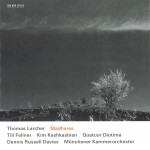 The most recent New Music Concert featured Quatuor Diotima, a Paris-based ensemble whose repertoire spans three centuries with a particular interest and expertise in the work of living composers. Of the works they performed in Toronto, by far the most intriguing was Madhares, the third string quartet by Thomas Larcher, who was born in Austria in 1963. This extended work called upon the musicians to employ a number of extended techniques, including tapping on the strings with wooden mutes to make eerie pointillistic glissandi up the neck of their instruments. The dynamic range varied from sub-audible to shriekingly loud in moments reminiscent of the shower scene from Psycho. But the piece was also imbued with beautiful melodies harkening back to pre-classical times and moments of languid calm. You can hear the work for yourself performed by Diotima on an ECM New Series release (ECM 2111) which also includes Larcher’s Böse Zelten for piano and orchestra and Still for viola and chamber orchestra with soloists Till Fellner and Kim Kashkashian and the Munich Chamber Orchestra under Dennis Russell Davies. Both of the concerted works have the intimacy of chamber music while exploiting the full resources of the orchestra. As with Oliver Schneller, the exploration of sound itself is paramount. The prepared piano is particularly effective in Böse Zelten whose title translates as Malign Cells.
The most recent New Music Concert featured Quatuor Diotima, a Paris-based ensemble whose repertoire spans three centuries with a particular interest and expertise in the work of living composers. Of the works they performed in Toronto, by far the most intriguing was Madhares, the third string quartet by Thomas Larcher, who was born in Austria in 1963. This extended work called upon the musicians to employ a number of extended techniques, including tapping on the strings with wooden mutes to make eerie pointillistic glissandi up the neck of their instruments. The dynamic range varied from sub-audible to shriekingly loud in moments reminiscent of the shower scene from Psycho. But the piece was also imbued with beautiful melodies harkening back to pre-classical times and moments of languid calm. You can hear the work for yourself performed by Diotima on an ECM New Series release (ECM 2111) which also includes Larcher’s Böse Zelten for piano and orchestra and Still for viola and chamber orchestra with soloists Till Fellner and Kim Kashkashian and the Munich Chamber Orchestra under Dennis Russell Davies. Both of the concerted works have the intimacy of chamber music while exploiting the full resources of the orchestra. As with Oliver Schneller, the exploration of sound itself is paramount. The prepared piano is particularly effective in Böse Zelten whose title translates as Malign Cells.
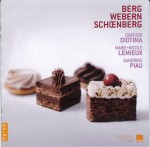 On the most recent release by Quatuor Diotima the group is joined by soprano Sandrine Piau and Canadian contralto Marie-Nicole Lemieux in works by Berg, Webern and Schoenberg (Naïve V 5240). Piau’s impeccable vocals are expected in Schoenberg’s String Quartet No. 2 where the third and fourth movements are settings of texts by Stefan George, but an unexpected treat is the sixth movement of Berg’s Lyric Suite where Lemieux sings the text inscribed by the composer in a miniature copy of the score sent to his “beloved” Hanna Fuchs. That only came to light thanks to Fuchs’ daughter after the death of Berg’s widow in 1976. I’m not sure if this is the first recording to include the sung text, but it is the first to come to my attention and Lemieux makes a convincing case for it. The quartet is impeccable in their interpretations of all the works, including the purely instrumental Sechs Bagatelles of Anton Webern.
On the most recent release by Quatuor Diotima the group is joined by soprano Sandrine Piau and Canadian contralto Marie-Nicole Lemieux in works by Berg, Webern and Schoenberg (Naïve V 5240). Piau’s impeccable vocals are expected in Schoenberg’s String Quartet No. 2 where the third and fourth movements are settings of texts by Stefan George, but an unexpected treat is the sixth movement of Berg’s Lyric Suite where Lemieux sings the text inscribed by the composer in a miniature copy of the score sent to his “beloved” Hanna Fuchs. That only came to light thanks to Fuchs’ daughter after the death of Berg’s widow in 1976. I’m not sure if this is the first recording to include the sung text, but it is the first to come to my attention and Lemieux makes a convincing case for it. The quartet is impeccable in their interpretations of all the works, including the purely instrumental Sechs Bagatelles of Anton Webern.
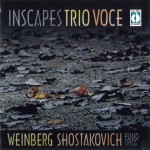 Mieczyslaw Weinberg (1919-1996) and Dmitri Shostakovich (1906-1974) share a remarkably similar voice and seem to have influenced each other profoundly. It is thought that much of Shostakovich’s interest in Jewish music stemmed from his friendship with the younger Pole. Weinberg’s Piano Trio was composed in 1945, two years before the masterpiece in the same genre by Shostakovich. I am very pleased to find both works featured on a new recording by Trio Voce, an ensemble which includes American violinist Jasmine Lin and Canadians Marina Hoover, founding cellist of the St. Lawrence String Quartet, and Alberta pianist Patricia Tao. The disc, entitled Inscapes (Con Brio CBR21045, www.conbriorecordings.com), includes not only the Weinberg trio Op.24 and Shostakovich’s familiar Op.67, but also a rare performance of the latter’s early first trio Op.8. The performances are sensitively nuanced and dynamic and the recording, done at WFMT Studios in Chicago last May, is immaculate.
Mieczyslaw Weinberg (1919-1996) and Dmitri Shostakovich (1906-1974) share a remarkably similar voice and seem to have influenced each other profoundly. It is thought that much of Shostakovich’s interest in Jewish music stemmed from his friendship with the younger Pole. Weinberg’s Piano Trio was composed in 1945, two years before the masterpiece in the same genre by Shostakovich. I am very pleased to find both works featured on a new recording by Trio Voce, an ensemble which includes American violinist Jasmine Lin and Canadians Marina Hoover, founding cellist of the St. Lawrence String Quartet, and Alberta pianist Patricia Tao. The disc, entitled Inscapes (Con Brio CBR21045, www.conbriorecordings.com), includes not only the Weinberg trio Op.24 and Shostakovich’s familiar Op.67, but also a rare performance of the latter’s early first trio Op.8. The performances are sensitively nuanced and dynamic and the recording, done at WFMT Studios in Chicago last May, is immaculate.
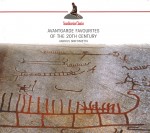 I’m not sure why, but it seems like kind of a “guilty pleasure” to revisit some of the masterworks of the past century upon which I “cut my teeth.” I tend to find it deplorable that so many of my generation never seem to get beyond the pop music they heard in their formative years, yet I also realize that the music which informed my own artistic development still remains my favourite. So it is with a grain of salt that I recommend Avantgarde Favourites of the 20th Century (Scandinavian Classics 220571-205) performed by the Arthuis Sinfonietta. But hearing Ligeti’s Chamber Concerto for Thirteen Instruments, Webern’s Concerto, Varèse’ Octandre, Lutoslawski’s Chain I and Takemitsu’s Rain Coming again after all these years was a real life affirming experience. To hear these seminal works so well performed in a new context was invigorating. And the addition of Harrison Birtwistle’s Ritual Fragment which I was not previously aware of was a real treat.
I’m not sure why, but it seems like kind of a “guilty pleasure” to revisit some of the masterworks of the past century upon which I “cut my teeth.” I tend to find it deplorable that so many of my generation never seem to get beyond the pop music they heard in their formative years, yet I also realize that the music which informed my own artistic development still remains my favourite. So it is with a grain of salt that I recommend Avantgarde Favourites of the 20th Century (Scandinavian Classics 220571-205) performed by the Arthuis Sinfonietta. But hearing Ligeti’s Chamber Concerto for Thirteen Instruments, Webern’s Concerto, Varèse’ Octandre, Lutoslawski’s Chain I and Takemitsu’s Rain Coming again after all these years was a real life affirming experience. To hear these seminal works so well performed in a new context was invigorating. And the addition of Harrison Birtwistle’s Ritual Fragment which I was not previously aware of was a real treat.
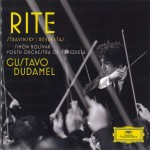 Another wonderful revisitation was an exuberant new recording of Stravinsky’s Rite of Spring by Gustavo Dudamel and the Simon Bolivar Youth Orchestra of Venezuela (Deutsche Grammophon 477 8775). Although appointed Music Director of the Los Angeles Philharmonic in 2009, Dudamel continues to work with the outstanding young players of his homeland as these thrilling live recordings from Caracas in February 2010 attest. As always Dudamel brings the best out in the youngsters and one would not likely guess this is anything other than a fully professional orchestra just by listening. The Stravinsky is paired with La noche de los mayas (Night of the Maya) by Mexican composer Silvestre Revueltas. Completed a year before the composer’s death in 1940 La noche had to wait twenty years for its first performance. Although not likely to replace Rite of Spring in the repertoire anytime soon, this is a dramatic, lyrical, colourful and powerful work that deserves to be much more widely heard. With Dudamel as its champion we can rest assured that it will be.
Another wonderful revisitation was an exuberant new recording of Stravinsky’s Rite of Spring by Gustavo Dudamel and the Simon Bolivar Youth Orchestra of Venezuela (Deutsche Grammophon 477 8775). Although appointed Music Director of the Los Angeles Philharmonic in 2009, Dudamel continues to work with the outstanding young players of his homeland as these thrilling live recordings from Caracas in February 2010 attest. As always Dudamel brings the best out in the youngsters and one would not likely guess this is anything other than a fully professional orchestra just by listening. The Stravinsky is paired with La noche de los mayas (Night of the Maya) by Mexican composer Silvestre Revueltas. Completed a year before the composer’s death in 1940 La noche had to wait twenty years for its first performance. Although not likely to replace Rite of Spring in the repertoire anytime soon, this is a dramatic, lyrical, colourful and powerful work that deserves to be much more widely heard. With Dudamel as its champion we can rest assured that it will be.
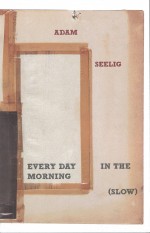 One of my finest musical experiences of the past several months was not a piece of music at all, but rather a book written by Toronto playwright and director of One Little Goat Theatre, Adam Seelig. Every Day in the Morning (slow) (New Star Books) is a novella crafted like a musical composition and typeset in a very graphic way – its very sparse text spread over the page like poetry, with far more white space than print. This affects, and effects, the way we read this monologue, with pauses built in as an inherent part of the process. Told alternately in third and first person, we are presented with the inner thoughts of a writer’s-block-ridden composer, railing against himself, the world, the classical music business, Steve Reich and the minimalists, his father and his childless marriage. It is effective and compelling. After my first reading I went back almost immediately and read the book again, aloud this time, and found it even more satisfying.
One of my finest musical experiences of the past several months was not a piece of music at all, but rather a book written by Toronto playwright and director of One Little Goat Theatre, Adam Seelig. Every Day in the Morning (slow) (New Star Books) is a novella crafted like a musical composition and typeset in a very graphic way – its very sparse text spread over the page like poetry, with far more white space than print. This affects, and effects, the way we read this monologue, with pauses built in as an inherent part of the process. Told alternately in third and first person, we are presented with the inner thoughts of a writer’s-block-ridden composer, railing against himself, the world, the classical music business, Steve Reich and the minimalists, his father and his childless marriage. It is effective and compelling. After my first reading I went back almost immediately and read the book again, aloud this time, and found it even more satisfying.
We welcome your feedback and invite submissions. CDs and comments should be sent to: The WholeNote, 503 – 720 Bathurst St. Toronto ON M5S 2R4.
David Olds
DISCoveries Editor
discoveries@thewholenote.com



